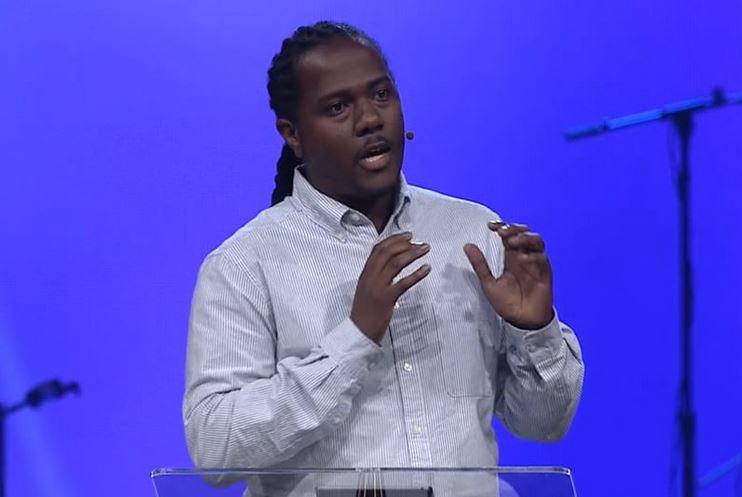At Urbana 18, Dominique DuBois Gilliard railed against Christians’ failure to denounce the U.S. prison system. Our failure to condemn America’s “mass incarceration” as racism-run-amok is “blood on our hands,” he said.
Gilliard’s hyperbolic language alleged that the U.S. system of imprisoning people for a variety of crimes is morally equivalent to killing them in cold blood. Not only that, but in a system founded upon a separation of church and state, the church bears equal guilt to the state for not interfering more in its affairs.
As Director of Racial Righteousness and Reconciliation for the Evangelical Covenant Church (ECC), and as a black man who grew up in the South, Gilliard has firsthand experience with the ongoing racial struggles in the U.S. and keen insight into the church’s lack of empathy for prisoners. He protested that poor minority communities continue to be marginalized by powerful institutions, and that the church isn’t even doing what it can to help. He protested that blacks and Latinos are disproportionately victims of the prison system, and that major prison reform is needed. He protested the church should do more to fulfill its duty to remember and visit prisoners (see Matthew 25:31-46 and Hebrews 13:3.)
However, on occasion Gilliard’s usually correct analysis slipped into unsubstantiated leftist talking points. For example, he said that American slavery lives on in the prison system. “Mass incarceration is a sinister system that dehumanizes people made in the image of God, caging them like animals and exploiting them for their labor.” If the reason why “caging” people is immoral is based on the image of God they carry, then it’s not just “mass” incarceration that is immoral. That would make all prison sentences—even of convicted serial killers, rapists, and Ponzi schemers—immoral. If Gilliard actually believed this argument, then reducing racial bias and overcrowding (his conclusion) is a woefully inadequate solution.
Now what about “exploiting” people “for their labor?” It seems falsely equating this with slavery, while ignoring actual modern-day slavery, was a common theme at Urbana 18. This forced labor, reports The Guardian, is household chores, like “cleaning, cooking, and lawn mowing”—the same type of tasks with which no righteous parent would ever exploit their high schooler. The prisoners who protest this treatment with hunger strikes seem to be living out the Biblical principle, “If anyone is not willing to work, let him not eat.”
Perhaps most concerning, Gilliard twisted the Gospel in service of his political argument. Christians should never believe that someone is “beyond redemption,” he said. Just look at Saul, who became Paul. We should never forget that Jesus did not wait to save us until we got our act together, but that he saved us while we were sinners. So far, that’s all fine to say, and adorned his argument beautifully. But then things started to get wacky:
Gilliard continued, “Christianity is predicated on grace, not meritocracy.” In an ultimate sense, saying our eternal salvation depends on grace, not merit is still correct. However, the principle of rewarding or promoting people based on demonstrated merit or talent is also Biblical (Ecclesiastes 4:13-15, Matthew 25:14-30). Gilliard said that meritocracy is a “fallacy” because it promotes a “dichotomy” between saints and sinners. It’s true that saints are not separated from sinners on merit, but that dichotomy exists all over Scripture, from the “sheep and goats” passage Gilliard cited earlier about caring for prisoners to Psalm 1 to Romans 8.
What Gilliard said next was truly surprising: “Punishment devoid of grace is not justice; it is vengeance, and that is not Christian.” This is, by definition, impossible. Justice is giving someone what he deserves. If he does wrong, what he deserves is punishment. Grace is giving someone mercy that he does not deserve. If someone has done wrong, then punishment devoid of grace is, pure and simple, justice. If you insert grace, it is no longer justice; it is grace. Gilliard doubled down, “No one should ever be defined by the worst thing they’ve ever done.” Well, by rights, everyone should be defined by all the worst things they’ve ever done. The whole scandal of Christianity is that God gives us grace instead of justice, considering us in terms of Christ’s righteousness instead of our unrighteousness.
Secondly, even though vengeance, in one sense, is not “Christian,” it is still right. Paul instructs the church in Rome, “never avenge yourselves, but leave it to the wrath of God, for it is written, ‘Vengeance is mine, I will repay, says the Lord.’” Proximately, continues Paul, God delegates vengeance to the governing authority, who “is the servant of God, an avenger who carries out God’s wrath on the wrongdoer.” What about when the government is unjust? Then, as Paul says elsewhere, Jesus himself will enact vengeance on the wrongdoer. God’s vengeance is our future hope! It is the only reason why we can endure injustice in the world now. Why would anyone want to undermine that?
Against the entrenched forces of injustice in the world, our efforts to serve prisoners will only succeed through the power of God. We should not expect that the power of God will accompany our efforts unless we maintain a Biblical understanding of the Gospel, and the difference between justice and grace, two often contrary concepts that paradoxically join at the cross of Jesus Christ.





Comment by Carrie on January 10, 2019 at 12:01 pm
“God’s vengeance is our future hope! It is the only reason why we can endure injustice in the world now. Why would anyone want to undermine that?” – Amen!!! –
Comment by Chip on January 14, 2019 at 11:07 pm
“God’s vengeace is our future hope! It is the only reason why we can endure injustice in the world now.”
Is it not rather that we endure injustice because we are being made more and more into Christ’s image, and he asked for his (and our) Father to forgive his enemies on the cross? Personally, I am not placing any hope in God’s vengeance — that is God’s prerogative, and from the Scriptures we know that he will be far more merciful than any of us might like in our fallenness. As Fr. Richard John Neuhaus once said in agreement with Hans Urs von Balthazar, we can dare to hope that all will repent and be saved– not that that will necessarily happen, but it is something we can hope, pray, and of course, work for as an end. (I am not espousing universalism in the least, just saying that a strong part of our Christian hope is that as few as possible will spend eternity apart from God.)
Now to look at it from another perspective, if you want to say that at least one of our great hopes is that God will set the world aright, then, yes, I would very much agree!